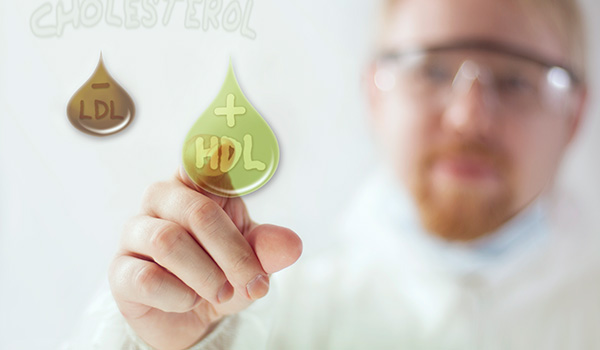
Tell the truth. When you think about cholesterol, what picture comes into your mind? “Cholesterol is bad for you.” Or did you think that “Cholesterol causes heart disease”. Perhaps it was that “Cholesterol will clog your veins and make you sick”. Yes? But is that the whole truth? And do you know the difference between HDL or LDL?
What is cholesterol?
Cholesterol is a biological chemical that is produced by the cells in your body. It is a product of your cells that forms an important part of your cells- the cell membrane. The cell membrane is the outermost part of a cell that keeps chemicals out and allows essential chemicals in depending on the needs of the body.
Apart from its’ important role as part of cell membranes, cholesterol also serves as a precursor chemical for the formation of certain hormones, bile acid and vitamin D in the body. Because it is a solid fat molecule, the downside of having too much cholesterol in your body is that it can accumulate in blood vessels and form what is known as plaque.
Plaque is notorious for blocking blood vessels and causing problems like coronary heart disease, the leading cause of death in the United States and stroke, the fifth leading cause of disease in the US.
And this is mainly why cholesterol has gotten a bad rap over the years. High cholesterol is an expensive health problem and usually, by the time the problem is recognized, it is too late.
When cholesterol is good for you?
This is where it gets tricky. On the one hand cholesterol is required for healthy cells, the production of hormones and vitamin D. And on the other hand, accumulating too much in your body causes fatal conditions.
So when is cholesterol good for you? To fully understand this, it is important to elaborate on the kinds of cholesterol that exist. Cholesterol can be grouped into two major categories namely low density lipoproteins (LDLs) and high density lipoproteins (HDLs).
LDLs are the bad type of cholesterol. When a doctor says your cholesterol is high, they are most likely talking about high levels of LDLs versus your HDLs which is the type of the cholesterol your body needs.
So your goal, when it comes to keeping cholesterol at low levels, is to reduce your intake of foods that contain the lousy kind of cholesterol.
It is interesting to note that, scientific research suggests that HDLs act in ways to clear your body of LDLs. Thus, the higher the level of this cholesterol the better. Foods that contain saturated fats such as butter, ghee, hard margarines and fatty meats are particularly high in LDLs. Reduce the amounts of these foods in your diet. Foods that are high in HDLs include olive oil, beans, legumes, nuts, chia seeds and flax.
How to keep your cholesterol at healthy levels
Keeping your cholesterol at a healthy level starts with checking your cholesterol levels.
During your yearly medical checkup, pay attention to your cholesterol levels from your blood work. Ask to see the raw results from your blood work and know them for yourself.
Don’t leave your healthcare into the hands of your doctor. You are your own best advocate and so study those results for yourself, so you are better equipped to discuss options with your doctor. If those results suggest that your LDLs are high, it is then time to make the necessary changes required for reducing your cholesterol levels.
These life changes include:
- Limiting your intake of foods that are high in LDLs like we mentioned above and increasing your intake of foods high in HDLs.
- Exercise. Losing weight reduces the incidence of cholesterol-related problems.
- Eating an overall balanced diet with the right amount of proteins, carbohydrates and good fats.
- Quitting smoking.
Numbers You Should Know
High cholesterol is diagnosed if your overall cholesterol level is above 200 mg/dL. In the table below, you will find the numbers you should aim for when it comes to cholesterol levels.
Cholesterol is measured in milligrams per 1 deciliter of blood (mg/dL).
| Desirable Levels | |
| Total cholesterol | Less than 200 mg/dL |
| HDLs | 40 mg/dL or higher |
| LDLs | Less than 100 mg/dL |
Closing Thoughts on HDL or LDL?
It is important to note that high cholesterol can affect anybody at any age. In fact, there is a genetic condition called familial cholesterolemia where children have high cholesterol even though they have a healthy lifestyle, and they may need to be given fat-reducing medications.
There is also a misconception that if you are not overweight, then your cholesterol is low. This is untrue. High cholesterol has no associated symptoms.
The only way of knowing that you have high cholesterol is to have lab tests done. Don’t wait until it is too late. Make sure you are taking advantage of yearly physicals to check on these numbers so you can take early action.

